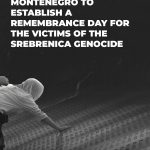
25 YEARS SINCE NATO BOMBING OF MURINA: FAMILIES STILL WITHOUT COMPENSATION AND WITHOUT STATUS OF CIVILIAN WAR VICTIMS
29/04/2024
THE CONTROVERSIAL PROPOSAL OF GIVING PAVLE BULATOVIĆ A CITY STREET HAS BEEN FORWARDED TO THE MINISTRY
03/05/2024Coalition of NGOs: No Compromise with the Policy of Crime

Prime Minister Spajić’s position, that Montenegro will vote for the UN resolution on memorialising the genocide in Srebrenica but will not promote it through co-sponsorship, represents a step backwards in the democratic development of Montenegro, as the only right and humane thing to do would be to use every opportunity to condemn this crime and not to hide the facts about it.
A strong civic initiative – as many as 100 NGOs and more than 320 prominent citizens of Montenegro – still managed to achieve a certain effect: we contributed to the Prime Minister at least publicly announcing his support for the resolution.
We are calling on members of the Government to carefully review the historical significance of this decision. The magnitude of the tragedy that took place in Srebrenica requires that the Government of Montenegro co-sponsor the resolution together with Slovenia, Croatia, Bosnia and Herzegovina, North Macedonia and other countries.
We regret that the UN resolution on Srebrenica represents a dilemma for the government in today’s Montenegro. But if it wants membership in the European Union, the government must prove that there are universal values that cannot be part of any political calculations.
Credible and progressive authorities must not make compromises with nationalists. There are issues that are absolute, and regarding which there can be no calculations but rather only one correct answer. In October 1991, the only correct answer was to be against the siege of Dubrovnik; in April 1992 – to be against the siege of Sarajevo; in May 1992 – not to hand over refugees to Mladić and Karadžić’s killers; in July 1995 – to prevent the genocide in Srebrenica, in April 1999 – to prevent the tragedy in Murino. Today, the only right thing is to co-sponsor the Resolution on the genocide in Srebrenica and thereby pay respects to the victims, condemn the perpetrators, and see to it that such a tragedy never happens again.
We do not accept the Government’s argument that “we should forget the past” while the ruling political parties are simultaneously participating in negative historical revisionism by memorialising the symbols of the wars of aggression of the 1990s, such as e.g. by changing the names of streets in Pljevlja and Podgorica.
Citizens of Montenegro recognise this as a value issue that should not be the cause of any dilemmas, and that is why we stood up against relativisation. Support for the initiative continues and we invite everyone to join.
We are asking the Government of Montenegro not to fall under the influence of retrograde forces, and that it rather helps democratisation in the region, to the benefit of all, by acting correctly and facing the difficult past.
Jovana Marović, Advisory Group “Balkans in Europe” (BiEPAG)
Dina Bajramspahić, civic activist
Tea Gorjanc Prelević, Human Rights Action
Daliborka Uljarević, Centre for Civic Education
Ljupka Kovačević, Centre for Women’s and Peace Education ANIMA
Maja Raičević, Centre for Women’s Rights
Milka Tadić Mijović, Centre for Investigative Journalism of Montenegro
Milica Kovačević, Centre for Democratic Transition
Zorana Marković, Centre for the Development of Non-Governmental Organisations
Velija Murić, Montenegrin Committee of Lawyers for Human Rights
Olivera Nikolić, Media Institute
Ivana Vujović, Juventas
Aida Perović, Prima
Jovan Ulićević, Spektra
Demir Ličina, Association “Štrpci – Against Forgetting”







 English
English